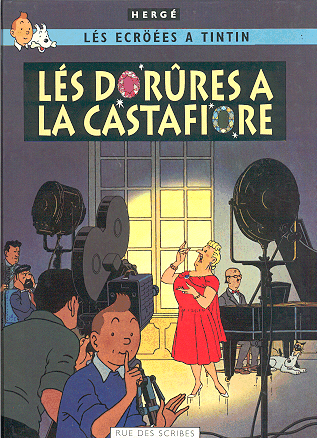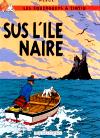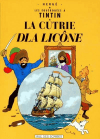| TINTIN LANGUAGES | |
| AFRIKAANS | |
| ALGUERES | |
| ALSATIAN | |
| ARABIC | |
| ASTURIAN | |
| BASQUE | |
| BERNESE | |
| BENGALI | |
| BRETON | |
| BULGARE | |
| CAMBODIAN | |
| CATALAN | |
| CHINESE | |
| CORSICAN | |
| CZECH | |
| DANISH | |
| DUTCH | |
| ENGLISH | |
| ESPERANTO | |
| FARSI | |
| FAEROESE | |
| FINNISH | |
| FRENCH | |
| FRIESIAN | |
| GALICIAN | |
| GALLO | |
| GAUMIAN | |
| GERMAN | |
| GREEK | |
| HEBREW | |
| HUNGARIAN | |
| ICELANDIC | |
| INDONESIAN | |
| ITALIAN | |
| JAPANESE | |
| KOREAN | |
| LATIN | |
| LUXEMBOURGER | |
| MALAYALAM | |
| NORWEGIAN | |
| OCCITAN | |
| PICARDY | |
| POLISH | |
| PORTUGUESE | |
| ROMANSCH | |
| RUSSIAN | |
| SERBO-CROAT | |
| SINHALESE | |
| SLOVAK | |
| SPANISH | |
| SWEDISH | |
| TAHITIAN | |
| TAIWANESE | |
| THAI | |
| TIBETAN | |
| TURKISH | |
| VIETNAMESE | |
| WELSH | |
| TOTAL 60 VERIFIED LANGUAGES | |
| RUMOURS | |
| MIRANDES | |
|
MONEGASCO |
|
| PROVENÇAL | |
| RUANDES | |
| MONEGASCO | |
| LINKS | CRAB MENÚ | CASTAFIORE MENU |
 |
GALLO | |||||||||||
|
||||||||||||
|
The
origins of French in Latin, more especially the Latin
spoken by ordinary folk throughout the Roman Empire, that is
Vulgar Latin. In the course, four broad periods are identified.
(i) the period of Vulgar Latin during the early and central
period of the Roman Empire when spoken Latin was fairly uniform
throughout all the countries of the Empire up to the first
century AD; (ii) the period of Gallo-Roman, (2nd-5th centuries
AD), which examines the Latin specifically of Gaul and the
underlying influence of the Celtic language of the Gauls,
Gaulish. (iii) the period of proto-French (6th- 9th centuries AD)
when a new nation was being formed, notably in the reign of
Charlemagne and when the language of newcomers, the Franks had a
considerable influence (iv) the period of Old French when the
modern language became relatively fixed. For each period, four
aspects of language development will be studied: phonology or
sound change, morphology or the study of flexion, syntax and
vocabulary. In the last part of the course, major changes will be
followed through Middle French, the Renaissance and up to the
modern period.Gallo
belongs to the Oil languages, different from French and which
seek recognition at educational and institutional level. Oil
anguages are spoken as lesser used languages in Belgium and
France.Gallo is taught as an optional subject and is accepted by
the educational authorities in Rennes as n optional subject in
the Baccalauréat.Gallo is spoken in the Eastern parts of
Brittany and in the 'Département' of Loire-Atlantique (Pays de
Loire region)
|
|
PUBLISHER RUE DES ESCRIBES |
|
ONLINE SHOPING |
|
LINKS
|


|
|
I'VE GOT THIS ONE | ! WANTED! |
